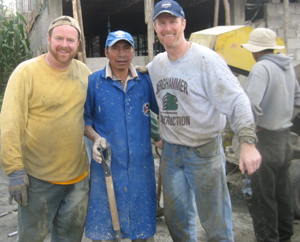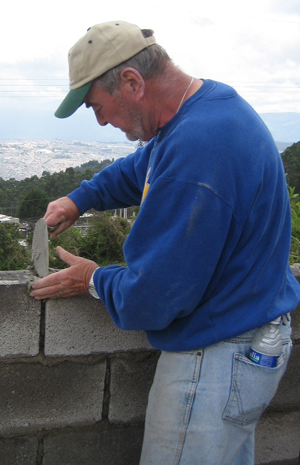
Imagine trying to build a home yourself. The project moves along as time permits among jobs, children, health issues and other life interruptions. Financing is also a factor as each wall or window is based on the foundation of resources available to pay for it. For anyone who has remodeled or built a home from the ground up, the frustration mounts as deadlines pass and with it, concerns that the job will remain unfinished.
In Quito, Ecuador, families face the realities of extreme poverty coupled with desires for safe housing and clean living. Imagine the citizens trying to build their homes while living day and night around trash, drinking contaminated water, and only a meager income to support their families, most of which comes from their young sons hawking newspapers or shining shoes. They don’t know where to go for help.
Fortunately, for them, they have 79-year-old Jesuit Fr. John Halligan, from South Bronx, N.Y., who has spent 45 years serving the thousands of poor from the Quito Working Boys Center.
Mingas benefit community
With a year-round volunteer staff and ongoing missionary workers, they often form a “minga.” A minga is a gathering of citizens who complete tasks to benefit the community. Mingas have existed in Ecuador since long before the Inca Empire. Everyone fulfills his or her obligation to the community by working for the common good. For example, mingas are called on to repair or maintain roads, water systems and forests, promote social and recreational programs, and, in many cases, to finish a home.
During a minga, men, women and children come to the village from miles around to help finish homes, carry rocks, transport clean water and build schools. Awestruck volunteers are amazed that the residents ask for nothing in return – often bringing food for everyone.
Together, they accomplish in a few hours or days what it would normally take weeks or years to finish.
For James and Patricia Parks, reaching out to help others includes their seven children Michael, 47, Jim Jr., 46, Patricia, 44, Patrick, 42, Peter, 39, Halligan, 35, and Tom, 33, and three adopted children, Martha, 54, Fabiola, 34, and Queta, 30, all from Ecuador.
“I have been involved with Working Boys Center since my sister, Sr. Miguel Conway BVM, went to work with Fr. Halligan in 1967,” said Patricia. “I founded Family Unity International to represent this cause in the United States.”

Poverty ‘moral’ not ‘economic problem’
Established in 1964, the Working Boys Center was formed for the young shoeshine boys, some as young as 6, and quickly changed to include entire families. Fr. Halligan’s mission is to eliminate poverty rather than serve as a temporary fix for hunger or misery.
The entire family participates in the program because the family is the basic unit of society and the principal means by which values are transmitted from one generation to the next, explained Patricia.
“Membership in the Working Boys Center is contingent upon taking personal responsibility for one’s condition and making a commitment to change attitudes and behaviors that work against success,” she said. “Poverty is a moral problem rather than an economic one and it is conquered only by development of a new value system. WBC families are given the education and support they need to develop a new and healthy way of life. In exchange for their commitment to embrace these new personal traits, center families receive education, meals, medical care and a general support system.”
Family United International is all-volunteer
Each of the Parks children worked as volunteers in Quito for a year or two and all are involved in fundraising events. For Jim and Patricia, maintaining the all-volunteer organization, Family Unity International, listed in the Official Catholic Directory under the auspices of the Milwaukee Archdiocese, is a monumental task.
“The FUI office is located in the den of my home,” said Patricia, member of St. Mary Visitation, Elm Grove. “I coordinate WBC activities in the states and communicate daily with the folks in Ecuador. My husband and grown children now assist in the day to day effort of banking and maintaining all records for FUI/WBC.”
Stamping out poverty, “one family at a time,” is the mission of WBC and FUI, and with improved telecommunications and technology, the Parks family is influencing thousands through their volunteer efforts and in reaching out to potential donors.
Each Parks family member has a specific calling; for Jim Jr, a member of St. Mary Visitation Parish, it is in handling the minga program.
Fr. DeVries ‘mastermind’ of minga program
“This was a program that Fr. Tom DeVries, (former pastor) of Lumen Christi masterminded as something that would be hands on and interactive for parishioners and give them a tangible, meaningful experience,” said Jim. “My mom asked me to get involved because I am bilingual and in construction and she thought that might help.”
Serving as the language liaison between crews, Jim helped one of the center families build a house with a minga. Until the crew from the states arrived to help, the residents and other volunteers would spend at least a year to build a three-bedroom 1,200 square foot house.
For more information or to volunteer: Call Family Unity International, Patricia Parks (262) 797-8988 Visit the Working Boys Center Web site. |
“It takes a lot of time to get the foundation and walls up,” he said. “But with the help of minga volunteers, the transformation is significant and the people are overwhelmed when we can get done in a week what takes them six months to do.”
Participating each February or March, Jim has traveled to Quito four times with a crew of seven-11 volunteers, and each time it has been reaffirming to him of the many blessings in his life.
“I think, why was I born in Milwaukee, rather than Quito and think about how it is such a random event. I see people down there and how they appreciate how little they have, and it really puts things into perspective when things don’t go right here,” he said. “I have learned to recognize that what I worry about isn’t really that important. At the end of a long day, I get much more out than I put in and my personal growth far exceeds the investment of time.”
Adopted daughter now a volunteer
Spiritual Journey to Quito, Feb 3-9Family United International is coordinating a Spiritual Journey to Quito, Ecuador, Feb. 3 to 9, 2010. The trip offers the natural beauty of the Andes mountains and the quaint small Ecuadoran towns and markets, but also an opportunity to see how the poor live and how they are helped through the Working Boys Center. Fully escorted by Jesuit Fr. John Halligan and Sister of the Blessed Virgin Mary Miguel Conway with accommodations and daily breakfast at a modern downtown hotel, the total cost is about $1,300. For more information, call Patricia Parks (262) 797-8988, e-mail her or visit the Web site. |
A Spanish teacher at Divine Savior Holy Angels, Martha was adopted from Ecuador at 14. She travels a couple of times a year to her homeland to volunteer at the Working Boys Center and to visit her 87-year-old biological mother. Next June she will lead a group of 10 students from DSHA to volunteer at the center and participate in mingas on Sundays.
“The experience strengthens my faith and we learned it all from our parents,” she said. “All 10 of us kids believe in the cause of helping others and it doesn’t matter how busy we are – we are here to help others.”
When youngest son Tom traveled to Ecuador, he not only spent what he described as the best two years of his life working with the families, he got back much more than he ever expected. He fell in love and met his wife Maria while working at the WBC.
“I have been married to her for eight years, and we have two children now,” he said. “We go back every year to visit my wife’s family – I have fond memories of my time at the Working Boys Center and I was happy to give back.”
Fr. Halligan’s mission transforms lives
For Patricia, the work reflects the holiness of Fr. Halligan’s mission to transform lives and break the cycle of poverty that has enslaved people for generations. While many people in their 70s are ready to slow down, she and Jim are energized by the selfless volunteers who reach out daily to the families in Quito.
“It strengthens my faith to see Fr. Halligan, my sister and all of the other dedicated workers in Quito living lives of service to others in an attempt to follow the Gospel message,” said Patricia. “It also strengthens my faith to see the poor people in Quito working so hard to improve their lives and to see my own kids as well as the other young college grads we have each year in Quito as volunteers who care enough to give a couple years of their young lives in service to others.”
To date, the Working Boys Center has graduated a staggering 5,000 families from its formation program and out of the cycle of poverty. Through daily meals, medical and dental services, Mass, personal hygiene training, day care, school, job placement and training, and learning about savings and budgeting, the center has succeeded where government handouts have failed. They have instilled faith-based self-sufficiency and the Parks family is proud of Fr. Halligan and Sr. Conway’s efforts.
“The Parks family involvement in this work has enriched our lives and made all of us better people who are more aware of the problems poor people face in their struggle to live a better life,” said Patricia. “It makes us grateful to God for all of our blessings.”
